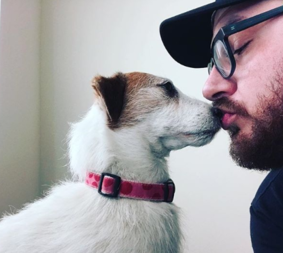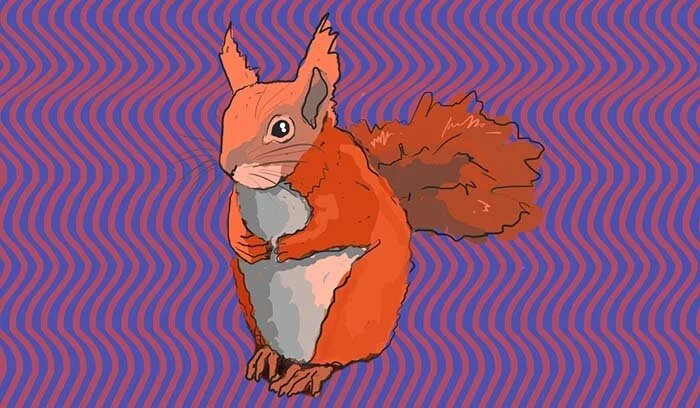Meet Wally, the Emotional Support Alligator
How an ex-Marine in Pennsylvania turned his pet reptile into a legitimate therapy animal.
By Javier Peinado
“He’s a big teddy bear that just wants to be loved and petted.” (Art: Elizabeth Zamets)
Joie Henney was in a really bad place.
An ex-Marine from York Haven, Pennsylvania, with no fewer than 18 grandchildren, Henney realized he was falling fast and hard into a depression. Three of his lifelong friends had just died, all in a matter of days from each other, and the 65-year-old was having difficulty coping with their losses.
Though his doctor prescribed him pills, Henney was ambivalent about taking the medication. Fortunately, there was another solution waiting for him at home, one he hadn’t yet realized could help him get over his depression. It was better than pills. It was his pet alligator, Wally.
“When I came home and was around him, it was all OK,” Henney told The Philadelphia Inquirer.
Things took a decisive step forward when Henney shared this with his doctor. He agreed to certify Wally as an approved Emotional Support Animal (ESA).
“My doctor knew about Wally and figured it works, so why not?” Henney said.
And just like that, the legend of Wally the emotional support alligator was born.
Henney acquired the 60-pound, 5-foot long Floridian alligator roughly four years ago when it was a mere 14-month-old hatchling. A lifelong animal-lover, Henney grew up on a farm and spent more than a decade hosting a hunting and fishing show on ESPN Outdoors called Joe Henney’s Outdoors.
When a friend near Orlando, Florida, needed to re-home a congregation of alligators living on a plot of land that was about to be developed into condos, Henney was one of the first people he called.
“Do you want a gator?” he’d asked him.
Henney responded with a resounding “yes” and decided to name his new friend after a cartoon character from his childhood: Wally Gator from the 1960s ABC program, “The Hanna-Barbera New Cartoon Series.”
Wally, who turned 4 in July, had been just two days removed from the wild before he came into Henney’s care. Luckily, he adjusted quickly and easily.
Nowadays, the emotional support alligator enjoys sleeping in a kitchen cabinet that Henney cleared out for him or lazing around on the couch or bed. When he’s not doing that, he’s likely watching TV or swimming in the 300-gallon plastic pond Henney built in his living room for both Wally and his newest alligator rescue, a 2-year-old named Scrappy.
By now you might be wondering, isn’t it dangerous to be so close with a prehistoric apex predator, let alone two? A species that reportedly killed 40 people in a 45-year span? And one that can eventually grow to weigh as much as 1,000 pounds?
Well, it turns out that the emotional support alligator is an affectionate and sweet cold-blooded comrade who loves to snuggle not snap.
“He’s a big teddy bear that just wants to be loved and petted,” Henney told The Inquirer.
An unmistakable head-turner, especially when he’s being walked on a leash like a dog, Wally visits senior centers, minor-league baseball games, and even holds his own meet-and-greets. People pet him and hold him and he’s never once bitten anyone. In fact, he’s afraid of the types of critters that other, more aggressive gators would gladly snack on, such as cats, bullfrogs, and even goldfish.
Earlier this year, Henney and Wally’s quirky, interspecies bromance went viral, leading to live TV appearances and the creation of the emotional support alligator’s own Facebook page.
But there’s no ignoring the elephant — er, alligator — in the room: Wally’s ESA designation has been controversial. Many wonder if it should be allowed, or even legal, to give an alligator the same certification as a golden retriever or a Burmese cat. While experts tend to agree that an ESA alleviates the disabling symptoms of mental health issues, the question lingers: Will any creature do, or is there a line that just can’t be crossed?
“We’ve seen cases in which young ducklings, small ferrets, or even baby pigs significantly help people with their mental health disability symptoms,” Lee Brian, senior vice president of customer service at Emotional Pet Support, told OK Whatever.
Still, the legal aspect of the whole thing remains blurry. Rebecca F. Wisch, associate editor at the University of Michigan’s Animal Legal & Historical Center, said the ESA certificates sold by some companies “mean very little, legally speaking.”
Unlike medical service animals, which are trained to do work or perform tasks for people with disabilities, ESAs are not granted any special privileges under federal law. They can’t be taken into restaurants or businesses where food is served, and are used most often as a means of getting around no pet policies at rented properties.
But even Wisch had trouble negating Wally’s validity as an emotional support alligator.
“While dogs are the most common type of assistance animal,” she conceded, “other animals can also be assistance animals.”
So the short answer is: Yes. Wally is a legitimate Emotional Support Animal.
And he’s certainly not the only one to raise eyebrows. Other ESAs have gotten attention for their presence at restaurants, supermarkets, and, most notably, airports. Last year, a Brooklyn artist tried to reserve a seat on a United Airlines flight for his therapy peacock. But, even though he had bought a ticket for his pet, the airline ultimately refused to allow it on the plane, citing weight and size restrictions.
Others have tried bringing Emotional Support ferrets, goats, hedgehogs, sugar gliders, and spiders on flights — to no avail. Trained mini horses, on the other hand, are reportedly considered on a case-by-case basis.
The debate about what constitutes as an Emotional Support Animal continues to grow, with colleges seeing a recent uptick in ESAs on campuses and in dorms where an ever-growing number of students are keeping their furry friends close to cope with the demands of college life.
As for Henney, the thing that matters most is that, not long ago, he was miserable. Now, thanks to his emotional support alligator, he’s not — and he couldn’t care less what other people have to say about that.
“You know, whatever works for you,” he told The Inquirer. “Dogs and cats don’t work for me.”





















